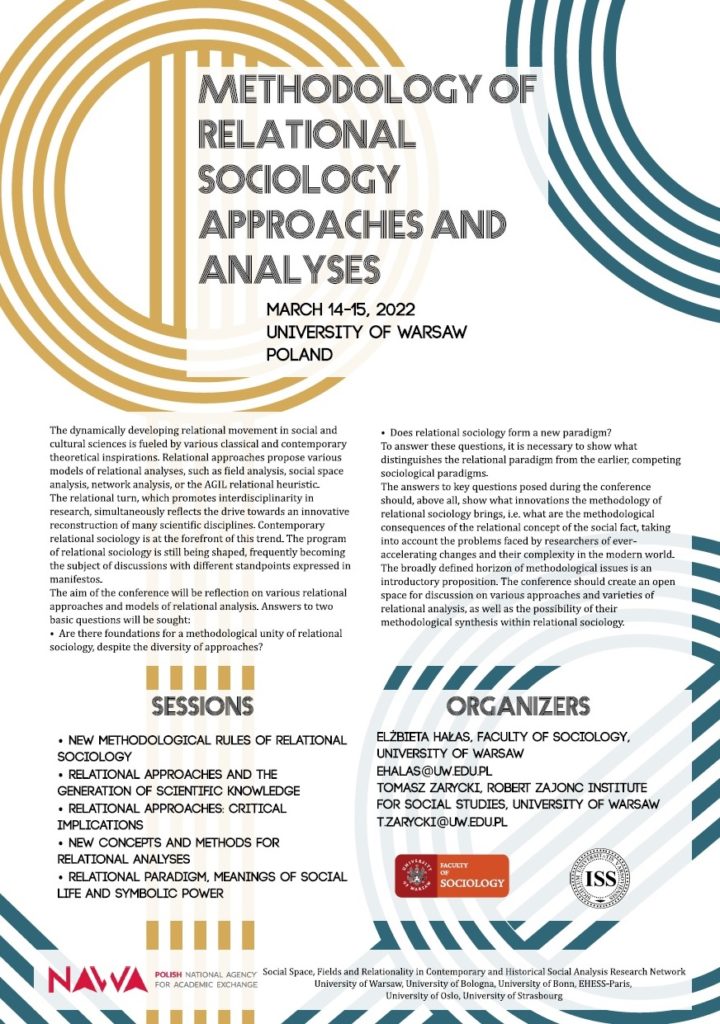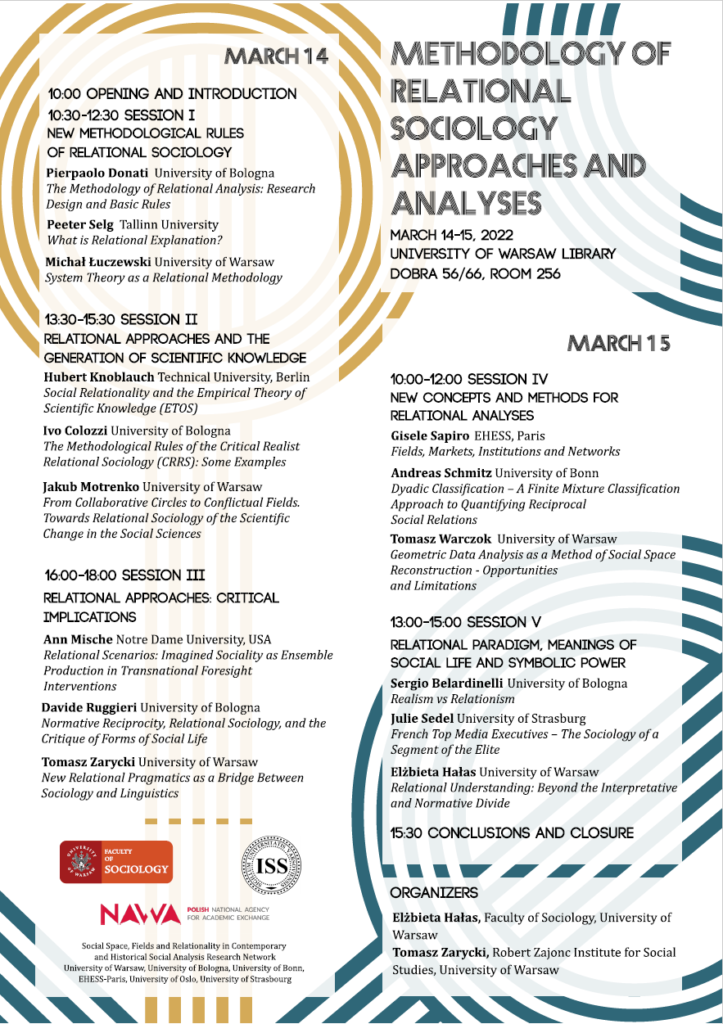Methodology of Relational Sociology
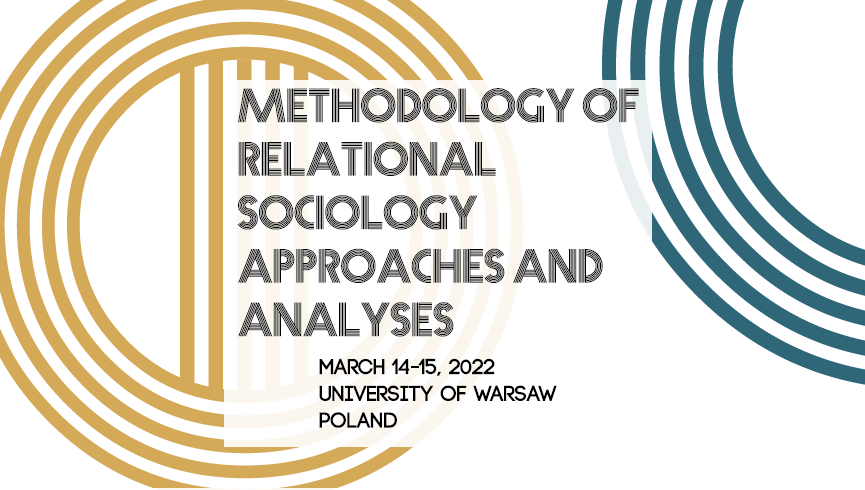
International Conference
Methodology of Relational Sociology
Approaches and Analyses
March 14-15, 2022
University of Warsaw
Project Social Space, Fields and Relationality in Contemporary and Historical Social Analysis. Research Network funded by the National Agency for Academic Exchange (NAWA)
Participants

Sergio Belardinelli, University of Bologna
Realism versus Relationism
Talking about relational sociology is like talking about a very multifaceted object. There are many relational sociologies nowadays and these are characterized by diverse philosophical and ontological presuppositions. It is a sort of inextricable mare magnum of different approaches, not all of them equally rigorous, most of the times in direct contrast one with the other, but for this reason this mare magnum is extremely interesting. Here I will examine two relational approaches that are firmly opposed to ontology in general, and in particular to the critical realism: the evolutionary and deconstructivist approaches. In the former case, we are in front of a pragmatic sociology that has simply to provide with specific tools to deal with specific issues; in the latter case, we only have mobile relations that continuously interact with other mobile relations, a relational caos with no precise aim and in constant change. Both of these approaches deem epistemology more important than ontology. I will show the advantages, even the epistemological ones, of what I define the realistic relational approach, that is an approach capable of keeping together both variances and invariances, both social fluctuation and structures. When we talk about social relations, it is always good to remember that we are dealing with both a relation (interaction, exchange) and an emerging effect, that is a structure that is endowed with permanence in the development of social life.
Sergio Belardinelli is Full Professor of Sociology of Culture at the Department of Political and Social Science of Bologna University.
His main research interests focus on ethical and political issues connected to the development of complex societies, with particular reference to bioethics and to the relationship between religion and politics, cultural identity and plurality of cultures.
Among his books:
L’altro Illuminismo. Politica, religione e funzione pubblica della verità, Rubbettino, Soveria Mannelli 2010; Sillabario per la tarda modernità, Cantagalli, Siena 2012; L’ordine di Babele. Le culture tra pluralismo e identità, Rubbettino, Soveria Mannelli 2018; All’alba di un nuovo mondo, Il Mulino, Bologna 2019 (co-authored with Angelo Panebianco).
2002-2006 he was member of the Board of the National Comitee for Bioethics;
2011-2015 he was member of the Board of the “Italian Institut of German Studies”.

Ivo Colozzi, University o Bologna
The Methodological Rules of the Critical Realist Relational Sociology (CRRS).
Some examples
“Therefore my relational sociology does not aim to create a “methodologicalrelationism to parallel the conceptualizations of individualism and holism,” ascalled for by Ritzer and Gindoff (1994, 5), but instead proposes an approachthat is an alternative to the oscillation, combination, or mediation betweenthese two opposites. Its underlying assumption is that “society is (not ‘has’)relations.” This means that: (1) the object of sociological investigation is thesocial relationality that constitutes that object (every object, such as work, politicalparticipation, health, the family, unemployment, war, economic enterprise,etc.); (2) every social phenomenon arises from a relational context and generatesanother relational context. This is the meaning of my statement according to which at the beginning of every social reality there is the relation.” (P. Donati, An Original Relational Sociology Grounded in Critical Realism, in F. Depeltau (ed.), The Palgrave Handbook of Relational Sociology, Springer International Publishing AG, Cham, Switzerland 2018, pp. 433-4).After a brief introduction on the ontological and epistemological choices that underpin Donati’s approach to relational sociology, the paper presents: the five rules of the method; an in-depth analysis on the use of the AGIL scheme as a “compass”; some illustrative examples on how to use the rules and a further example that presents the methodological aspects and the research design developed by Donati for the survey on Social Capital in Italy.
Ivo Colozzi, formerly Full Professor of General Sociology at the University of Bologna, is currently Professor Alma Mater of the University of Bologna. For many years he has collaborated with Pierpaolo Donati, with whom he has carried out and / or directed many researches published in various volumes. Among these we remember: P. Donati and I. Colozzi, Giovani e generazioni (Young people and generations), Il Mulino, Bologna 1997; P. Donati and I. Colozzi (eds.), La cultura civile in Italia: fra stato, mercato e privato sociale (Civil culture in Italy: between state, market and Third Sector), Il Mulino, Bologna 2002; P. Donati and I. Colozzi (eds.), Il valore aggiunto delle relazioni sociali (The added value of social relations), FrancoAngeli, Milano 2011.
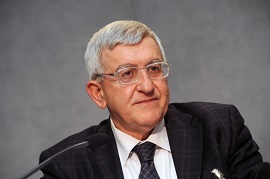
Pierpaolo Donati, University o Bologna
The methodology of relational analysis: research design and its basic rules
The paper illustrates how the specific relational sociology proposed by the author intends the construction of the research design through five basic rules. The first rule: distinguish between descriptive and problematizing observation, and connect them. The second rule: define the observed fact as a relational social molecule based on the relational AGIL scheme. Third rule: express the social fact Y as the product of a combination of Xi factors in a black box. Fourth rule: investigate the black box as a morphostatic / morphogenetic process that generates the social fact. Fifth rule: if the research is aimed at social intervention, configure the research design as a relational Observation-Diagnosis-Guiding system. The paper ends by explaining in what sense relational analysis is value-free.
Pierpaolo Donati is Alma Mater Professor (PAM) of Sociology at the University of Bologna. Former President of the Italian Sociological Association, he has served as Counsellor in the Board of the IIS, and since 1997 is member of the Pontifical Academy of Social Sciences. He is internationally known as the founder of an original ‘relational sociology’ or ‘relational theory of society’. Recent publications: Sociología relacional de lo humano (Eunsa 2019); Пьерпаоло Донати. Реляционная теория общества (Москва: Москва Издательство ПСТГУ, 2019); Scoprire i beni relazionali (Rubbettino 2019); Transcending Modernity with Relational Thinking (Routledge 2021); Lo sguardo relazionale (Meltemi 2021).
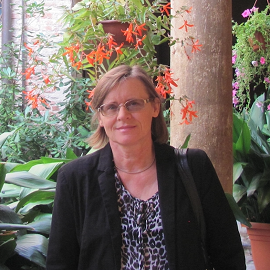
Elżbieta Hałas, University o Warsaw
Relational Understanding: Beyond the Interpretative and Normative Divide
The problems of understanding and meaning are strongly intertwined with building sociological theory from its classic beginnings. A key question emerges concerning the relational solution to this problem. Relational sociology goes beyond reconstructive efforts to rebuild systematic sociology.
The aim of this paper is to search for an innovative approach to the problem of relational understanding. It combines relational perspectives of agents and observers, as well as objectified systems of meanings that are grounded in social relations. A relational approach to understanding implies a stratified concept of meaning: cognitive, evaluative, and affective.
Sociology of the 20th century has been plagued by the opposition between interpretative and normative paradigms. Relational understanding overcomes this counterproductive divide.
Elżbieta Hałas is Full Professor of Humanities and Sociology at the Faculty of Sociology, University of Warsaw, Poland. Her fields of interest include: cultural sociology, relational perspectives in social theory, symbolic interactionism, social symbolism, memory and politics of symbolization. Her research is focused on the relational, semiotic and pragmatic dimensions of contemporary cultural and social transformations. In 2016, she initiated international seminars on relational sociology in Poland. In 2021, she founded the Center for Relational Analyses of Culture and Society at the University of Warsaw. She has published numerous articles in international journals, such as Time and Society, Sign System Studies, Symbolic Interaction, Polish Sociological Review, as well as several books including Towards the World Culture Society: Florian Znaniecki’s Culturalism (Frankfurt am Main 2010); Symbole i społeczeństwo [Symbols and Society] (Warszawa 2007; Russian transl. in 2021); Przez pryzmat kultury [Through the Prism of Culture] (Warszawa 2015); edited books including: Life-World, Intersubjectivity and Culture: Contemporary Dilemmas (Frankfurt am Main 2016); Relational Reason, Morals and Sociality (Berlin 2021, co-editor); Politics of Symbolization Across Central and Eastern Europe (Berlin 2021, co-editor), and written multiple book chapters. She co-edited with Pierpaolo Donati the special issue of State of Affairs/Stan Rzeczy 2017, vol. 12: “The Relational Turn of Sociology. Implications for the Study of Society, Culture, and Persons”.
Faculty of Sociology, University of Warsaw, Karowa 18, 00-927 Warsaw, Poland
ORCID: 0000-0001-6021-3110
e-mail: ehalas@uw.edu.pl

Hubert Knoblauch, Technical University of Berlin
Social Relationality and the Empirical Theory of Scientific Knowledge (ETOS)
The presentation is based on the approach of Communicative Constructivism. This approach builds on Social Constructivism in extending it in various ways. One of the most crucial extension consists in the basic relationality characterizing social and communicative action. Relationality does not only refer to relations between humans but includes relations to any kind of objectivation. The approach has been not only elaborated theoretically, it is also inspired by a range of methodical developments in the empirical study of social actions. On the background of these two pillars, the paper will focus on its consequences for the methodology and the theory of the social sciences. The theoretical assumption that knowledge does not originate in an individual actor’s consciousness does, first, affect the individualistic assumptions of many theories of knowledge. It has also consequences for the role, function and legitimation of scientific knowledge production and transmission, which will be the subject of the main part of the presentation.
In this main part, the concept of Reflexive Methodology will be sketched which forms part of a new “Empirical Theory of Science”. While the normativity of how science should be done has been the subject matter of the Philosophy of Science for a long time, it has been the recent contribution of Science Studies to demonstrate empirically that much of the methods used in science as a social practice often go unnoticed. It is the goal of the Empirical Theory of Science (ETOS) to link these two approaches to science in a way which avoids both the idealism of the philosophy of science and the relativism of science studies.
Hubert Knoblauch is Professor of General Sociology at the Technical University of Berlin. His areas of research are Sociological Theory, Sociology of Knowledge, Religion and Communication, Qualitative Methods, particularly Videography and Ethnography. Recent Publications include Powerpoint, Communication, and the Knowledge Society (Cambridge University Press 2013), Videography. Introduction to Interpretive Videoanalysis of Social Situations. Springer 2014), and The Communicative Construction of Reality (London/ New York: Routledge 2020).

Michał Łuczewski, University of Warsaw
System Theory as Relational Methodology
Relational sociology (RS) demonstrated the centrality of relations in social life, yet it underexplored human psyche. Despite its drive to integrate various paradigms, such as Parsonian or Luhmannian ones, it has eventually failed to draw on non-sociological theories of systems (Donati, Hałas 2017). In consequence, the analyses of human psyche provided by relational sociology remain strikingly schematic and superficial. Relational sociology should not, however, stop short of analyzing individual level (see Margaret Archer’s concept of “internal conversation”). In my presentation, I would like to focus on two system theories, that could be crucial allies in developing relational methodology on the level of individuals.
Rene Girard’s mimetic theory (MT) has developed relatively disembodied representation of our psyche. It is in this vein that Martha Reineke (2014) has long advocated for less cognitive and more intimate vision of human subjects in MT. I want to argue that a misrecognized Girardian psychological model of the mind is to be found not in those closest modalities but in Internal Family Systems (IFS), as developed by Richard C. Schwartz. I believe that the comparison between MT and IFS will create a relational model of human mind. In my perspective, IFS unbeknownst to itself applies the mimetic logic to our psychic life, while MT realizes IFS’s ambitions of addressing social and cultural phenomena.
There are striking similarities between mimetic theory and IFS. Genetically, they both draw on Batesonian systems theory, which Girard applied to great novelists and later on – cultural phenomena, while Schwartz to families and later on – individuals. Both perspectives are based on a premise that fundamental human phenomena are polarizations between rivals and ensuing scapegoating. They both concur that the unconscious is our rival/model/scapegoat. The crucial difference between them lies, however, in the fact that Schwartz showed that “triangular desire” is not only played out in social world between “interdividuals” but above all between parts of our psyche (addressed in other systems as subpersonalities, voices, archetypes etc.) which take on three roles: scapegoats (in Schwartz’s terms: exiles), perpetrators (called firefighters) and heroes (managers). This assumption allows us to extend “interdividual psychology” inside and address our “interdividual parts”, to precisely conceptualize “intimate mediation” and to embody human subjects. The conclusion of my talk will be a relational model of human mind that would open a new vista for both relational sociology and methodology.
Michał Łuczewski, PhD, sociologist, psychologist, professor of sociology at the Department of Sociology, University of Warsaw. In the past decade, he combined his academic career with taking on leadership roles and growing engagement in the public life of Central Eastern Europe. As an academician, he was a Fulbright Scholar at Columbia University, a Jozef Tischner fellow at the Institute for Human Sciences in Vienna and a lecturer at the joint MA-program of Centre for Social Studies in Warsaw and Lancaster University. His books were published in Polish, German, English and Czech. His first book Eternal nation. How Catholics became Poles? (“Odwieczny naród. Polak i katolik w Żmiącej”) was awarded Stefan Ossowski prize and Józef Tischner prize for the best books in Poland. His last book Moral Capital. The Politics of History in Late Modernity (“Kapitał moralny. Polityki historyczne w późnej nowoczesności”) addressed the question of emerging political and public religions in Poland, Germany and Russia. Currently he is looking for practical applications of relational sociology to organizational development, leadership and psychotherapy.

Ann Mische, University of Notre Dame
Relational scenarios: imagined sociality
as ensemble production in transnational foresight interventions
The paper will build on a chapter from my book-in-progress, which examines the use of scenario thinking in transnational interventions related to democracy, development, peacebuilding and climate change. My book examines how “public interest” scenario projects have emerged since the 1990s as a field of transnational foresight practice, linking multi-sectoral actors in the Global North and South in addressing issues of urgent public concern (war, poverty, inequality, autocracy, climate change, food scarcity, etc.). In this paper, I will focus on how narratives and networks are intertwined in the production of these scenario projects. The paper thus builds on the analysis of multiple intersecting networks that was critical to my earlier work, and links it to my new work on multiple possible futures.
There are two ways in which “relationality” figures into the production of imagined futures. First, these transnational scenario projects constitute what I call “ensemble productions” – they are produced by assembling a multi-sectoral scenario team purposefully composed of people with diverse, often contending perspectives. Practitioners claim that the diverse relational composition of the scenario team is essential to its ability to challenge assumptions and move past mental biases in order to generate fresh, innovative insight into future possibilities. That is, practitioners claim that relations are critical to the imagination of possible futures.
Second, the narratives about multiple possible futures produced by these scenario projects contain stories about future relations. These stories not only depict how social, political, and economic actors populate possible futures, but also how they interact with each other in various forms of imagined future sociality. Relations therefore are core elements in the imagined unfolding of future events.
In other words, relationality contributes to imagined futures in two ways: relations between multi-sectoral actors contribute to the discursive “co-production” of scenario narratives, while also being represented as “imagined interactions” within these narratives. Moreover, scenario projects are embedded in – and help to constitute – larger fields of power and politics. That is, “who is at the table” (and who is excluded or marginalized) affects “who is in the story,” and how their interactions are imagined to play out in projected future time. This dual relationality of scenario work thus informs how futures are currently being re-imagined amidst global inequalities and constraints.
Ann Mische’s research focuses on communication, deliberation and leadership in social movements and democratic politics. She has examined these processes in her study of Brazilian youth politics during re-democratization as well as her work on anti-partisanship in Brazil’s recent protest wave.
Currently, she is working on a book on the role of futures thinking and foresight methodologies in social and political change efforts across global networks focused on democracy, development, peacebuilding and climate change.
Mische’s first book, Partisan Publics: Communication and Contention Across Brazilian Youth Activist Networks, was awarded an honorable mention for the 2009 Best Book Award of the American Sociological Association’s Political Sociology section. This book examines the relation between partisanship and civic association in Brazilian youth politics during 20 years of democratic restructuring. Using interpretive and network-analytic approaches, Mische tracks the trajectories of five “micro-cohorts” of activists through partisan, civic, religious, business, labor and social movement networks and their associated “publics.” She examines the distinct styles of political communication and leadership that emerged across these publics, and considers the implications for democratic politics in Brazil and elsewhere.
Mische is currently conducting research for a second book, tentatively entitled, Futures in Contention: Public Scenarios and Transformative Politics in the Global Arena (under advance contract with the University of Chicago Press). The book examines how cultural technologies for future-oriented deliberation—including scenario planning, strategic foresight, and futures visioning—are being used in transnational debates and interventions related to democratic governance, social and economic inequality, political violence and environmental degradation.
She focuses in particular on the use of participatory scenario methods by democratic reform actors in the Global South, as well as on their links to transnational networks of sponsors and partners. She is currently conducting collaborative research in Kenya on several historic scenario processes in East Africa since 2000. She will expand to comparative case studies in Latin America and Southeast Asia in the coming year.
This book builds on Mische’s previous theoretical work on how cultural construction of the future influences actions, relations and political process (American Journal of Sociology, 1998; Sociological Forum, 2009). It also builds on a study that Mische is conducting with a team of Notre Dame graduate students, using automated text analysis and relational mapping to examine future-oriented discourse in debates at the 2012 UN Conference on Sustainable Development (Rio+20) and the accompanying “People’s Summit” of social movement and civil society actors. Preliminary findings appeared in a recent article in Theory and Society (2014).
Mische’s articles on the Brazilian case have appeared in Poetics, the International Review of Social History, and several edited volumes, including Social Movements and Networks: Relational Approaches to Collective Action (Oxford, 2003). She has also written broader theoretical articles on agency, culture, temporality, and social interaction, appearing in the American Journal of Sociology, the Annual Review of Sociology, Sociological Forum, Social Research, Theory and Society and the Sage Handbook of Social Network Analysis (2011).
Mische has served as chair of two sections of the American Sociological Association: Political Sociology (2013-14) and Theory (2007-08). She has also served as an elected officer in the sections on Sociology of Culture and Collective Behavior and Social Movements. She served as co-editor of Social Movement Studies: A Journal of Social, Cultural, and Political Protest (2001-2008) and on the Selection Committee for the SSRC’s International Dissertation Research Fellowship (2007-09). She was one of two University of Notre Dame faculty members to receive the 2021 James A. Burns, C.S.C., Graduate School Award, an award which recognizes outstanding faculty mentorship.
Recent Work
Video profile: Peacemaking and our Perceptions of the Future »
Video: Theology of Joy as a Transformative Movement (Yale Center for Faith & Culture)
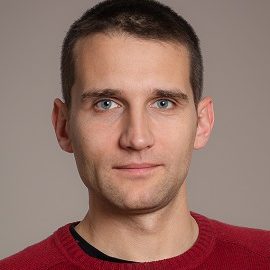
Jakub Motrenko, University of Warsaw
From collaborative circles to conflictual fields.
Towards relational sociology of the scientific change in the social sciences
If we follow a sociological intuition that new knowledge comes from interaction, it is necessary to ask what form of interactions favours originality which may lead to scientific change. At the first glance there is a striking controversy between those who claim that new ideas are born in conflictual environment and those who hold that close relations of friendship are necessary for creative thinking. One simple answer comes to mind to resolve this apparent inconsistency. As Simmel would say, different social forms are associated with the same content: empirically, we could show that either conflictual or intimate relationships might produce new ideas. But this answer is not satisfactory from the theoretical point of view. An aim of this paper is, first, to include competition and cohesion in one single theory. Second, to explain when group solidarity might lead to intellectual opportunity and constant struggle to simple mirroring the ideas of the adversary and when the opposite. While doing this I will keep classical belief shared by historians of ideas, that a new thought arises from richness of origin concepts refined by genius of scholars.
Jakub Motrenko, philosopher, sociologist, assistant professor at the Faculty of Sociology of the University of Warsaw. His interests lie at the meeting point of philosophy, the sociology of science, and the history of sociology. He recently published the monograph The Anti-Positivist Turning Point in Polish Sociology. (in Polish, Wydawnictwo Naukowe “Scholar” 2021).

Davide Ruggieri, University of Bologna
Normative Reciprocity, Relational sociology, and the Critique of forms of social life
In the frame of sociological studies of the last thirty years, Relational Sociology (RS) represents not only an ontological, epistemological, and methodological novelty: it denotes that a new society is at work and that social relations are the very pivotal subject of investigation in social sciences. The recent international debate on RS nevertheless acknowledges that many approaches and meanings given to the “social relation” (i.e. process, interaction, network, communicative event, etc.) makes this subject a very slippery matter. Pierpaolo Donati, who is a pioneer into RS, tackled directly this aspect, distinguishing between “relationist” and “relational” approaches: the former is a reductionist theory (legitimizing a relativist theoretical view and removing differences between human and not human agency), whilst the latter maintain the relation as a condition of transcendence in order to understand the relational society we are challenging in and which does not renounce to inquiry on the human. Starting from a relational frame, recent studies (the edited volume of Elżbieta Hałas and Aleksander Manterys) have been focussing on some pure relational (that is non-utilitarian and instrumental) aspects of sociality which draw a civil society under cultural plurality, requiring a wide reflection upon relational rationality (relational reason) as a convergence point of sociological and moral issues.
In this paper, I regard and advance reciprocity as normative when it charges an equal access to interaction as a duty under social, moral, and political meanings, triggering and promoting a good (social) life. The main aim is to highlight the inner normative dimension of social relations: assuming relation as an emerging form means that it should steer social agency, avoiding the pure contingency of considering it as a mere process or interaction (that is under an immanent or relativistic view). Only maintaining the social relation as transcendent, it could be regarded under normative aspects. Finally, under a methodological meaning, the purpose of this paper is stressing, encouraging, and fostering the dialogue (the relation) between social sciences and moral philosophy, namely between RS and Critical Theory, focusing on social relations as the very core (as well as forms) of social life, questioning how RS can assume issues related to good society and good life, that is exploring how good relations make flourish and preserve good society and good life. This does not necessarily mean addressing new tasks for sociology which stands as a descriptive discipline (that is, neither being prescriptive or normative, nor predictive). Yet the challenge of RS is precisely to question that limit or relation between both two spheres, descriptive and normative.
Davide Ruggieri is RTDb/Senior Assistant Professor of Sociology of cultural and communicative processes at the Department of Political and Social Sciences of the University of Bologna (Italy). PhD in Sociology in 2015 (University of Bologna), his main research field tackles the history of sociological theories, the relation between culture and individualization within the social processes. Main academic and scientific results on Georg Simmel’s sociology, Critical Theory, and the Relational sociology. Research and archive activities abroad in the Universities of Mainz, Frankfurt am Main, Berlin, Bielefeld, and Munich. Author of many publications, he attended to various scientific national and international conferences.
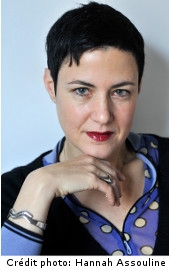
Gisele Sapiro, École des hautes études en sciences sociales (EHESS), Paris
Fields, Markets, Institutions and Networks
Gisèle Sapiro est directrice de recherche au CNRS et directrice d’études à l’EHESS (Centre européen de sociologie et de science politique), membre de l’Academia Europeae. Spécialiste de sociologie des intellectuels, de la littérature et de la traduction, elle est l’auteure de La Guerre des écrivains, 1940-1953 (Fayard, 1999, rééd. 2006 ; traduit en anglais chez Duke UP, 2014), La Responsabilité de l’écrivain. Littérature, droit et morale en France XIXe-XXIe siècle (Seuil 2011) et La Sociologie de la littérature (La Découverte, 2014 ; traduit en espagnol chez Fondo de Cultura Economica, 2016 ; à paraître en japonais). Elle a également (co-)dirigé: Pour une histoire des sciences sociales (Fayard, 2004), Pierre Bourdieu, sociologue (Fayard, 2004), Translatio. Le marché de la traduction en France à l’heure de la mondialisation (CNRS Editions, 2008) ; Les Contradictions de la globalisation éditoriale (Nouveau Monde, 2009) ; L’Espace intellectuel en Europe (La Découverte, 2009) ; Traduire la littérature et les sciences humaines : conditions et obstacles (DEPS, 2012) ; Sciences humaines en traduction : les livres français aux Etats-Unis, au Royaume-Uni et en Argentine (Institut français-CESSP, 2014, en ligne). Elle est responsable du projet européen Interco-SSH (International Cooperation in the SSH).
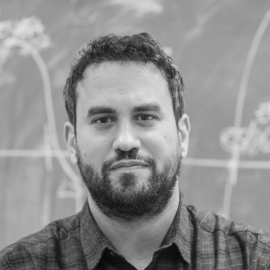
Andreas Schmitz, University of Bonn
Dyadic Classification – A Finite Mixture Classification Approach
to Quantifying Reciprocal Social Relations
Relationships between two entities represent a fundamental aspect of almost any (relational) sociology. Concepts such as communication, interaction, exchange, reciprocity, negotiation or intersubjectivity provide us with theoretical concepts for analyzing this aspect of relational reasoning. While theoretical and qualitative approaches to this fundamental analytical area of relational sociology are highly elaborated, a striking deficit of quantifying methodology is to be noted at this point. Classical, unidirectional regression models model average individuals, classification methods group types of entities, network methods construct overall networks or cliques in networks, and methods of geometric data analysis construct spaces of actors. In contrast, there is a lack of quantification of dyadic relationships. This research deficit is addressed in the presentation. A statistical classification model for classifying dyadic data using finite mixture models will be presented. This method allows us to identify latent types of dyadic constellations and to reveal which feature combinations are essential for the emergence and persistence of dyadic classes. Studies from the field of family sociology serve as empirical examples. The method will be motivated by different theoretical perspectives: Bourdieu’s practice theory, Doing Gender theories and exchange theories.
Andreas Schmitz, Institute for Sociology, University of Bonn & Gesis, Dept. Computational Social Science (Cologne) is currently working on his project on comparing scientific fields. Before that, he was interim professor of sociology at RWTH Aachen University, Germany. His main research interests are relational social theory, relational methodology, applied statistics, and generalized field theory.

Julie Sedel, Strasbourg University
French Top Media Executives – The Sociology of a segment of the Elite
Although they hold positions of power in a strategic sector, connected to the political field, there has so far been little scholarship on top media executives. In academic and activist discourse, the register of media self-celebration and its symmetrical opposite, denunciation, fuel the myth of the almighty media executive. This article intends to move beyond this commonplace perception by analyzing this professional group. France is an interesting case as far as studying news media elite goes. First, the importance of politics and literature in French journalism has been noted by a number of scholars (Chalaby, 1997, Benson, 2002). As Paolo Mancini and David Hallin put it: “The media developed in Southern Europe as an institution of the political and literary worlds more than of the market” (Hallin, Mancini, 2004, p. 90). As a result, news media are perceived more as political platforms and tools of influence than as for profit businesses by stakeholders in France (Chalaby, 1997). Another specificity of the French media field singularity lies in the centrality of the State. This centrality is visible not only through the concentration of political, cultural and media institutions in Paris and its surroundings, but also through the fact that degrees and positions inside the State determine professional careers.
This communication aims at contributing to the sociology of elites by examining a specific type of elite, in a relational perspective. It aims to shows that, being situated at the intersection of several social spaces, media executives exemplify the struggles between different fractions of the elite over the definition of the types of capital expected to prevail in the field of power.
Julie Sedel is a lecturer in sociology and political science at the University of Strasbourg, and a researcher at SAGE (Society, Actors, Government in Europe, UMR 7263). She holds a habilitation to direct doctorates. Her current research focuses on media management elites (Dirigeants de médias. Sociologie d’un groupe patronal, PUR, 2021) and the place of women amongst them (“Le genre du Quatrième pouvoir”, Le Temps des médias), the role of the news media in the production of social problems (Les médias et la banlieue, INA/Le bord de l’eau, 2013 [2009]), News media ownership in a comparative perspective (with R. Benson, How Media Ownership Matters, forthcoming), spokes-persons in the public sphere (with P. Juhem, Agir par la parole. Porte-paroles et assymétries de l’espace public, PUR, 2016).

Peeter Selg, University of Tallin
What is relational explanation?
To make sense of what are the specifics of relational explanation I outline the core distinction between causal and constitutive explanation, research methodology and design. I demonstrate that constitutive explanation is what is at stake in relational analyses of social phenomena, since relational world-view presumes relations to be constitutive of phenomena. I compare it to the highly influential form of causal explanation that is characteristic of variable-centered approaches in the social sciences. With recourse to philosophy of science I also explain why constitutive explanation always entails abductive research logic. I untangle the specificity of abduction in view of the two prevalent logics in scientific and theoretical thinking – induction and deduction – and demonstrate the essentially processual and relational character of abduction. Abduction is a processual movement from puzzling empirical phenomenon to theoretical propositions and other observations making it intelligible and then back to the phenomenon through which both the identity of the phenomenon as well as the corresponding theoretical premises and statuses of other observations can change, and the process is never completely final, since the “final” result itself is a part of the process. I also illustrate the application of relational explanation by explaining the different constitutions of the COVID-19 crisis and their governmental responses in Taiwan and USA during the first two waves of the crisis, using the materials gathered for a forthcoming book A Relational Turn in Governing Wicked Problems: From Governance Failure to Failure Governance (to be published by Palgrave Macmillan in 2022, authored by Peeter Selg, Georg Sootla and Benjamin Klasche).
Peeter Selg, PhD (from Tallinn University, 2011), is Professor of Political Theory in the School of Governance, Law and Society at Tallinn University, Tallinn, Estonia. His main research interests include relational sociology, political semiotics, power, governance, and wicked problems. His work has been published among other outlets in Sociological Theory, PS: Political Science & Politics, Journal of Political Power, International Relations, International Review of Sociology, Journal of Language and Politics, Semiotica, and Sign Systems Studies. His recent book (with Andreas Ventsel) is titled Introducing Relational Political Analysis: Political Semiotics as a Theory and Method (Palgrave Macmillan, 2020). He is the editor (with Nick Crossley) of the book series “Palgrave Studies in Relational Sociology”.

Tomasz Warczok, University of Warsaw
Geometric data analysis as a method of social space reconstruction
opportunities and limitations
Bourdieu’s sociological approach suggests a relational understanding of the social world which is clearly visible in his field theory and the social space analysis. However, Bourdieu’s relational epistemology not only considers the social as relational but also uses relational tools for empirical investigations. Thus, geometric data analysis (GDA), with an emphasis on multiple correspondence analysis, is considered the best method to study social spaces and fields. Since GDA depends on spatial distances, the relational thinking is appropriately transferred with this explorative method with which data on actors’ characteristics are translated into a multidimensional space that is presented as a map, in order to identify and represent underlying structures in data. An advantage of this approach is that the actors’ characteristics are reconstructed on the basis of their amount of capital that translates into a relative position within social space, instead of analyzing a priori categories. Moreover, GDA allows, combining numerous qualitative variables, not only to reconstruct the map of individuals and their social properties, but also to demonstrate the geometrical relationships and structural causality between the space of positions (“active” variables, e.g. capitals held, treated as “independent”) and the space of position-takings (“passive” variables, e.g. ideological stances and strategies, considered “dependent”).
Tomasz Warczok is Assistant Professor (adjunkt) at the University of Warsaw. His main research interests are cultural and historical sociology, field theory, discourse analysis and geometric data analysis.

Tomasz Zarycki, University of Warsaw
New relational pragmatics as a bridge between sociology and linguistics
The paper will develop a proposal for what I will call the new relational linguist pragmatics, that is, pragmatics taking into account the broader, structurally defined relations of power. This proposal will go beyond what is usually called the “critical discourse analysis,” which usually takes clear political stances and offers a critique strongly embedded in a given politically defined point of view. In the present paper, I will strongly rely on Bourdieu’s version of relational sociology, in particular notions of the field of power and homology. As it will be argued, the basic binary oppositions on which meanings negotiated in specific social interactions, are produced in the field of power of any society. It constitutes the basic engine through which relations of power shape symbolic sphere a given society. The basic oppositions produced in the field of power are then translated to other social fields and eventually to specific social interactions through the mechanism of homology. Homology, which may be seen both as a relation (to the field of power) and as a process (in particular of enforcing power relations), is never perfect; in different contexts, it remains partial to different degrees, depending on the scope of autonomy of specific fields or narrower spaces of social interactions. But it is always present and may be seen as a key mechanism of production of social meanings. Such a revised, strongly relational vision of pragmatics will allow making a strong linkage between linguistics, including semiotics, and sociological analysis. It will offer a new way of making the processes of meaning production a central focus of sociological analysis, however avoiding risks of assuming a purely discursive vision of social relations, or as Bourdieu puts it, the semiological vision of the world.
Tomasz Zarycki is Professor and Deputy Director of the Robert Zajonc Institute for Social Studies at the University of Warsaw, Poland. He holds “habilitation” degree in sociology from the Institute for Philosophy and Sociology of the Polish Academy of Sciences in Warsaw. His research focuses on historical sociology of politics, sociology of elites, sociology of knowledge, critical sociology and discourse analysis with particular focus on Polish and Eastern European societies. His latest book in English is Ideologies of Eastness in Central and Eastern Europe (Routledge, 2014).
His earlier books include: “Gra peryferyjna: Polska politologia w globalnym polu nauk społecznych” (“A Peripheral Game: Polish Political Sciences in the Global Field of Social Sciences”, co-authored with Tomasz Warczok, Warszawa, 2016), “Totem inteligencki: Arystokracja, szlachta i ziemiaństwo w polskiej przestrzeni społecznej (“An Intelligentsia’s Totem: Aristocracy, nobility and landowners in the Polish social space”, co-authored with Rafała Smoczyński, Warszawa, 2017), “Peryferie. Nowe ujęcia zależności centro-peryferyjnych” (“Peripheries. New approaches to centre-periphery relations”, Warsaw: Scholar, 2009), “Kapitał kulturowy. Inteligencja w Polsce i Rosji” (“Cultural Capital. The Intelligentsia in Poland and Russia”, Warszawa 2008), “New Regional Identities and Strategic Essentialism. Case studies from Poland, Italy and Germany” (co-author, Münster: LIT Verlag, 2007), „Region jako kontekst zachowań politycznych”, (Region as a Context of Political Behavior”, Warszawa, 2002). His articles appeared in such journals as “Communist and Post-Communist Studies”, “East European Politics and Societies”, “Europe-Asia Studies”, “GeoForum”, “Journal of Communist Studies and Transition Politics”, “Kultura i Społeczeństwo”, “Russian Education & Society”, “Social Science Information”, “Theory and Society” and several others.
